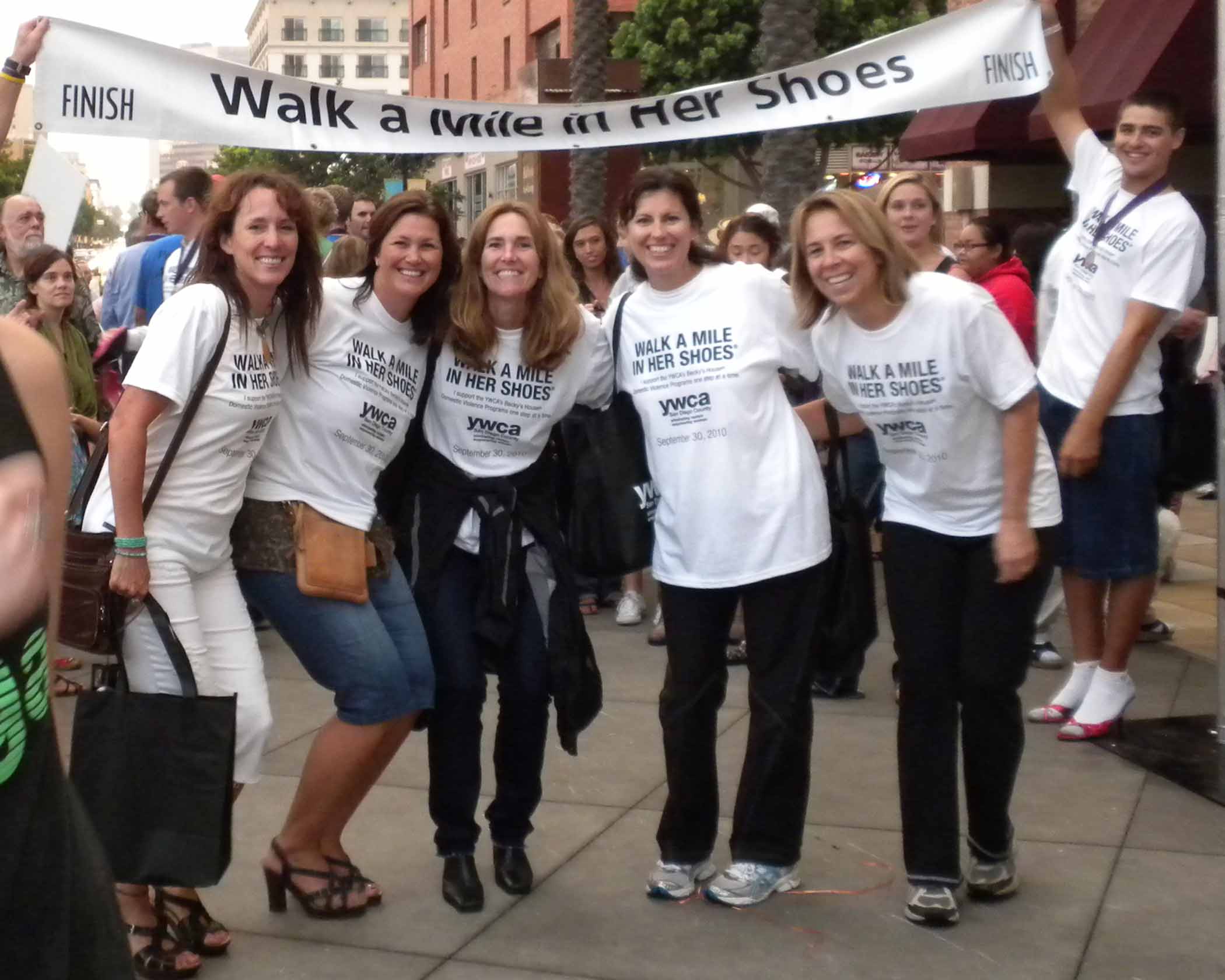Domestic violence is on a lot of people’s minds. In the past two weeks there has been no shortage of dialogue riddled with the, who did what to whom, whose fault was it and who ultimately needs to pay the price now. And all that talk leaves me wondering what will happen if the domestic violence blame game remains the focus.
This is just one of the many concerns running through my mind since TMZ Sports leaked the video footage of Ray Rice knocking Janay Palmer unconscious inside an elevator. A video I did not need to watch because, as I wrote about in my book, Tornado Warning, A Memoir of Teen Dating Violence and Its Effect on a Woman’s Life, I have lived it.
Since the release of the video I have listened as conversations have swept the nation; everything from what domestic violence is, to the inconsistent ways the NFL commissioner managed the players who commit it and other crimes.
There have been many incredible articles written. There have been courageous campaigns on social media about why we stay and why we leave. And there have been fabulous examples of men calling upon each other to be part of the solution.
I have been silent because everything I have read and listened to only led to more questions…
- If we really are outraged then shouldn’t we find the personal resolve to unpack the systemic issues behind—both our attitude toward, and the causes of—domestic violence?
- Where was our outrage—yours and mine—in February?
- How do we manage our emotions while Ray McDonald of the 49’ers, among others, suit up during what is known as due process?
- And how do we begin to make sense of the staggering statistics that tell us domestic violence impacts 1 in 3 women and 1 in 10 men in this country?
- And given that statistic…how many children are growing up in a household where verbal and physical abuse is all they know?
Although I celebrate that there is a national dialogue about intimate partner violence taking place now, I would be remiss if I didn’t also acknowledge my concern with the fact that the public outcry didn’t exist without the video.
Our earlier silence now begs a new question:
- Did we really not have a problem with domestic violence until we could see it on film?
After all, we were seemingly complacent about the footage of Janay Palmer being dragged from an elevator unconscious. We held our tongues until we could see for ourselves what the underbelly of violence looked like.
Everyone would prefer that domestic violence and sexual assault just go away–they are ugly. Yet closing our eyes to the countless injustices makes us culpable.
Where was our outrage when Jovan Belcher murdered Cassandra Perkins then killed himself? Back then we demanded nothing of the NFL and there was zero interruption of the football season.
This is what MSN News reported:
Kansas City Mayor Sly James said that he spoke to Pioli after the shooting, and while he refused to discuss the GM’s emotional state, the mayor said Pioli was “extremely concerned that fans of this team are not disappointed and not left in the cold.”
“I think they think there’s an obligation to the people of this city, the fans of the team and the fans of the other team to play the game,” James said.
God forbid we discuss the “emotional state” of a man who was witness to a suicide. No. Instead let’s perpetuate the stereotype that men are not allowed to access, let alone discuss, their emotional state.
To think that as a people we didn’t possess the will to demand the cancellation of a football game after a football star murdered the mother of his child then killed himself is nothing short of obscene.
The pressing concern was “our disappointment.”
Cassandra Perkins was robbed of her life. I doubt “disappointment” is what her family felt, I’m going to go out on a limb here and guess they were in fact outraged.
If we don’t look back and take the time to examine our behavior and attitude then, how can we expect for there to be real change now?
It seems to me that our next steps are critical if we truly want the eradication of intimate partner violence. Yet by all observations the focus seems more centered on blame, the issuance of which is endless and that worries me. It worries me because it distracts us from what is needed most; solutions.
The chief targets in the blame game are of course Ray Rice, Roger Goodell and the NFL as a whole.
It is so much easier for us to make Ray Rice the pariah than to look at the cold truth. Ray Rice is one man out of thousands of men that have perpetrated domestic violence. Although it may be easier for us to think of abusers as the bogeyman, they aren’t. Abusers can be anyone regardless of their gender, ethnicity, socioeconomic status, or sexual orientation. That means the abusers and the victims are among us and certainly aren’t limited to the NFL.
Once while speaking to a classroom of college students, I asked them what a victim and abuser looked like. Describe them, I challenged. They laughed. The conversation that followed their laughter was the understated obvious: you simply cannot identify a victim or an abuser other than to say they are human. We don’t have the ability to see emotional bruises and scars, people wear those on the inside.
We can blame Ray Rice, but shaming and blaming him is not going to help. Which was one of the many excellent points that Courtney Martin made in her article The Violence of Humiliation:
I don’t know the wounds that Ray Rice carries with him, but I know they’re there. That’s not to absolve his actions, but it is to attempt to understand them. Our energy is wasted vilifying him; that only serves to separate out the “good guys” from the “bad guys” — an immature dichotomy.
There is no denying that Roger Goodell’s missteps are many. Whether he is the right person to lead the charge for change is an important question to be vetted, but when we focus solely on his inaction before the video was made public two things happen.
- We feel better about ourselves because the spotlight is on him not us.
- We lose precious time that could be spent creating solutions for change.
And change is needed. Change is needed within the NFL. And change is needed with us.
According to the National Coalition Against Domestic and Sexual Violence:
Domestic violence is an epidemic affecting individuals in every community, regardless of age, economic status, sexual orientation, gender, race, religion, or nationality. Intimate partner violence is often accompanied by emotionally abusive and controlling behavior, which is only a fraction of a systematic pattern of dominance and control. Domestic violence can result in physical injury, psychological trauma, and in severe cases, even death. The devastating consequences of domestic violence can cross generations and last a lifetime.
In other words domestic violence affects every single one of us.
When it comes to sports, the NFL is far from alone with the mishandling of players who have been charged with domestic violence. In one example, The New York Times, rightfully raised the issue of US Soccer’s handling of soccer star Hope Solo with respect to the domestic violence charges that were filed against her last summer.
The NFL has issues. And the good news is they are now solutions focused. This was evidenced when they publicly announced on September 15th the guidance they have asked for to help shape league policy.
Now we know what the NFL is doing about the NFL issue.
But knowing that domestic violence touches all of us begs yet another question:
- What can we do to move from the paradigm of blame, to being active participants in the solution?
Victims need our help. Perpetrators need our help. Children who witness domestic violence need our help. Survivors need our help. Bystanders need our help.
Now that the underbelly of domestic violence has been exposed there is no going back, so what are we going to do to help prevent it?…
Here are 8 things you can do today to help end domestic violence and sexual assault:
Do you have an attitude worth catching? Every time you open your mouth in front of a child, teen or young adult, you are shaping their mind and sowing seeds for future behavior. Ask yourself if what you give away is worthy of being caught.
2. Educate Yourself and continue the conversation
Abuse does not discriminate: It can happen to anyone regardless of gender, ethnicity, socioeconomic status, or sexual orientation. The best way to prevent is to get more information and then share your knowledge. According to the Love is Respect organization:
- Girls and young women between the ages of 16 and 24 experience the highest rate of intimate partner violence — almost triple the national average.
Research has taught us that people are not comfortable initiating a conversation about domestic violence and sexual assault—yet the past two weeks have cracked that door open—so let’s push it even wider. Looking for ways to bridge the conversation with your young adult? Read, Tornado Warning, together and use the reader’s guide to create a conversation right away.
3. Join the NO MORE Organization
NO MORE is a unifying symbol designed to galvanize greater awareness and action to end domestic violence and sexual assault.
Because it’s someone you KNOW. Say it. Share it. Show it. Join the countless people who have shared why they say, “NO MORE!” At the No More Organization, you too can raise your voice and post your thoughts to the campaign by sharing why you say: NO MORE.
4. Go from Bystander to “Upstander”
Learn from The Pixel Project how you can go from being a Bystander to an Upstander and actively help to stop Violence Against Women in your family and community.
5. Start a program in your workplace to address partner violence. Not sure where to begin?
Partner with the Corporate Alliance to End Intimate Partner Violence, a non-profit organization whose mission is to aid in the prevention of partner violence by leveraging the strength and resources of the corporate community. They believe that business plays an essential role in raising awareness of the issue and that their sustained efforts will help reduce and ultimately eliminate partner violence.
6. Get involved! Check out, It’s On Us, a campaign to end sexual assault then take the pledge.
7. Participate in Domestic Violence Awareness Month events
The National Network to End Domestic Violence has a great list of suggestions for ways you can get involved.
8. Donate to any number of organizations working to end domestic violence.






Our society promotes violence in so many ways: through sports, film and broadcast entertainment, games, and through inequality in which violence toward certain groups of people is more tolerated than against others. And it all begins at the level of individual tolerance.
Agree. Thank you for sharing your perspective Nancy.
Very helpful blog full of REAL helpful tips and tools. I love – Go From Bystander to Upstander!
Thanks Ellen, glad you found it helpful.
Speak it, sister. I believe all this publicity is a good thing, because pro sports is being forced to say how unacceptable DV is and that I hope will leak over into the general community.
Thanks Carol, yes I rather like the idea of it leaking over too!
I’ve been hoping you would weigh in. The blame game has seemed totally off point and distracting from the real issue, which is that a man beat a woman and that this happens all the time. Why aren’t we more outraged? I don’t know. I think, as a society, we’ve become jaded and complacent and overwhelmed with information we don’t know how to handle. You give a lot of good points here and I hope we all become active and break through the silence.
Thanks Lois. I think you make a great point about the sense of overwhelm. Outrage is temporary, what we do with it, with any luck, can be powerful.
Thank you for the links!
A great article about a heartbreaking topic.
Thanks Michelle, I appreciate your being here today.
I don’t feel numb to this conversation but it has morphed into a wider conversation that doesn’t allow for shorthand. I enjoyed reading your perspective.
It has morphed into a wider conversation. So many points of view. Thank you for taking the time to read where I am at today.
Thanks for adding your voice of reason to the conversation. And extra thanks for the links to the organizations.
Thanks Barbara! Glad you found the links helpful. 🙂
Thank you for this wonderful piece with real world suggestions about how to become involved and become part of the solution
You are so welcome! Thank you for taking the time to visit, read and comment, very appreciated.
I love that you not only dealt with the topic head on – no crap, no dancing around the edges – and moved beyond “outrage” to anger. I think many feel powerless and clueless that every single one of us can move from disbelief and anger to action.
I want to scream your statement “If we don’t look back and take the time to examine our behavior and attitude then, how can we expect for there to be real change now?” Perfectly articulated…. Thank you.,…
Thank you Ruth! Action is so much more fun (and productive) than anger too.
Writing a different kind of article a coupke of months ago I found out that my adopted home state SC has the highest domestic violence statistics in the whole country. I have wondered what I can do to make a difference. Thanks for these groups I will definitely be checking them out.
Thanks for stopping by today Rena! Love that you have been inspired to help with this cause and hope one of the links will lead you to a group that resonates.
Great article, really on point.. I’ve been in abusive relationships myself; my abuse was more emotional with a sprinkling of physical, either way, abuse hurts. I left my emotionally abuse 1st husband when he started swing guns around and I never looked back. Now, when I hear all these stories of murder/suicide, I think back to those days and I’m so glad I made the call. I’ve recently left a job of 17 years because the new own had the same mannerisms as my past spouse; explosive verbal abuse. I’m in control of myself now, I stood up for myself this time too; I got my new boss to respect me more, trouble is, I lost respect for him.. NEXT…
Thank you for taking the time to read my thoughts and for your willingness to share your experiences here too.
I don’t know how I missed this, but it is excellent and worth sharing widely. I love that you pinpointed specific action steps and kept the focus on what we, as individuals, can and should be doing to stop DV everywhere.
Well done, my friend!
Thank you for your support Mary, I appreciate it a lot.